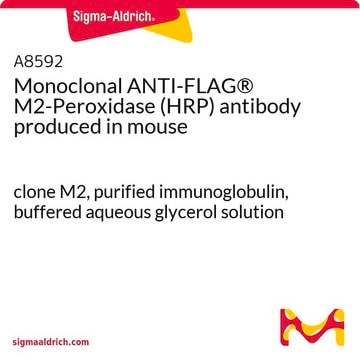A2582
Anti-Thioredoxin–Agarose antibody produced in rabbit
IgG fraction of antiserum, PBS suspension
Sinónimos:
Anti-Thioredoxin
About This Item
Productos recomendados
biological source
rabbit
Quality Level
conjugate
agarose conjugate
antibody form
IgG fraction of antiserum
antibody product type
primary antibodies
clone
polyclonal
form
PBS suspension
mol wt
antigen 11.7 kDa
species reactivity
E. coli
analyte chemical class(es)
proteins (thioredoxin)
technique(s)
affinity chromatography: suitable
immunoprecipitation (IP): suitable
shipped in
wet ice
storage temp.
2-8°C
target post-translational modification
unmodified
¿Está buscando productos similares? Visita Guía de comparación de productos
General description
Specificity
Immunogen
Application
Biochem/physiol Actions
Physical form
Preparation Note
Disclaimer
¿No encuentra el producto adecuado?
Pruebe nuestro Herramienta de selección de productos.
Elija entre una de las versiones más recientes:
¿Ya tiene este producto?
Encuentre la documentación para los productos que ha comprado recientemente en la Biblioteca de documentos.
Nuestro equipo de científicos tiene experiencia en todas las áreas de investigación: Ciencias de la vida, Ciencia de los materiales, Síntesis química, Cromatografía, Analítica y muchas otras.
Póngase en contacto con el Servicio técnico






